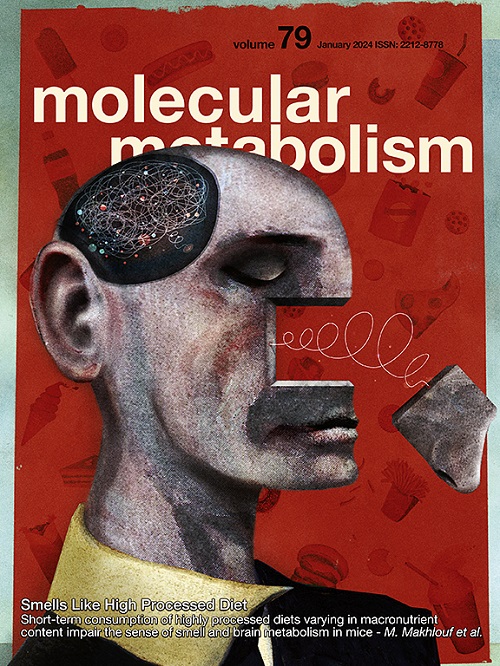Adiponectin-receptor agonism prevents right ventricular tissue pathology in a mouse model of Duchenne muscular dystrophy
IF 6.6
2区 医学
Q1 ENDOCRINOLOGY & METABOLISM
引用次数: 0
Abstract
Objective
Cardiac fibrosis during Duchenne muscular dystrophy (DMD) arises from cellular damage and inflammation and is associated with metabolic dysfunction. The extent to which these relationships develop across all 4 cardiac chambers, particularly during early-stage disease, remains unknown.
Methods and Results
We discovered that very young D2.mdx mice exhibit fibrosis exclusively in the right ventricle (RV) and left atrium. Concurrent myocardial disorganization in the RV was related to a highly specific inflammatory signature of increased infiltrating pro-inflammatory macrophages (CD11b+CD45+CD64+F4/80+CCR2+), myofibre mitochondrial-linked apoptosis, and reduced carbohydrate and fat oxidation. This relationship did not occur in the left ventricle. Short-term daily administration of a peptidomimetic adiponectin receptor agonist, ALY688, prevented RV fibrosis, infiltrating macrophages, and mitochondrial stress as well as left atrial fibrosis.
Conclusions
Our discoveries demonstrate early-stage cardiac tissue pathology occurs in a chamber-specific manner and is prevented by adiponectin receptor agonism, thereby opening a new direction for developing therapies that prevent tissue remodeling during DMD.
脂联素受体激动作用预防杜氏肌营养不良小鼠右心室组织病理。
杜氏肌营养不良(DMD)期间的心脏纤维化是由细胞损伤和炎症引起的,并与代谢功能障碍有关。这些关系在所有4个心室中发展的程度,特别是在早期疾病期间,仍然未知。我们发现很小的D2。mdx小鼠仅在右心室(RV)和左心房显示纤维化。RV并发心肌解体与高度特异性的炎症特征有关,包括浸润性促炎巨噬细胞(CD11b+CD45+CD64+F4/80+CCR2+)增加、肌纤维线粒体相关凋亡以及碳水化合物和脂肪氧化减少。这种关系没有发生在左心室。每日短期给药一种拟肽脂联素受体激动剂ALY688,可预防左心房纤维化、浸润性巨噬细胞、线粒体应激以及左心房纤维化。我们的发现表明,早期心脏组织病理以腔室特异性的方式发生,并通过脂联素受体激动作用进行预防,从而为开发防止DMD期间组织重塑的治疗方法开辟了新的方向。
本文章由计算机程序翻译,如有差异,请以英文原文为准。
求助全文
约1分钟内获得全文
求助全文
来源期刊

Molecular Metabolism
ENDOCRINOLOGY & METABOLISM-
CiteScore
14.50
自引率
2.50%
发文量
219
审稿时长
43 days
期刊介绍:
Molecular Metabolism is a leading journal dedicated to sharing groundbreaking discoveries in the field of energy homeostasis and the underlying factors of metabolic disorders. These disorders include obesity, diabetes, cardiovascular disease, and cancer. Our journal focuses on publishing research driven by hypotheses and conducted to the highest standards, aiming to provide a mechanistic understanding of energy homeostasis-related behavior, physiology, and dysfunction.
We promote interdisciplinary science, covering a broad range of approaches from molecules to humans throughout the lifespan. Our goal is to contribute to transformative research in metabolism, which has the potential to revolutionize the field. By enabling progress in the prognosis, prevention, and ultimately the cure of metabolic disorders and their long-term complications, our journal seeks to better the future of health and well-being.
 求助内容:
求助内容: 应助结果提醒方式:
应助结果提醒方式:


